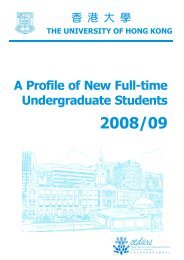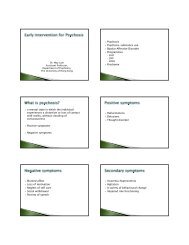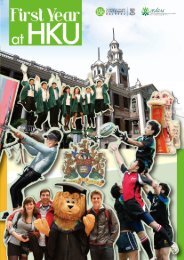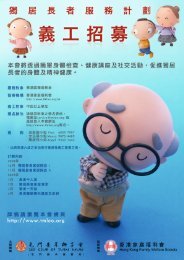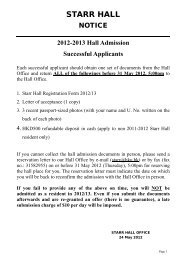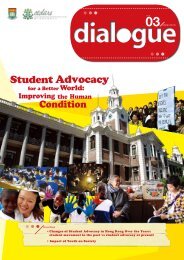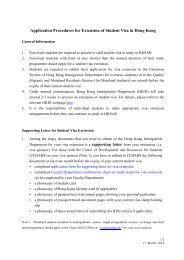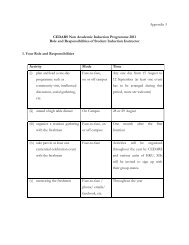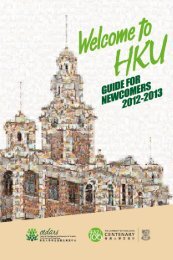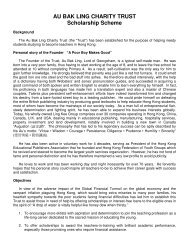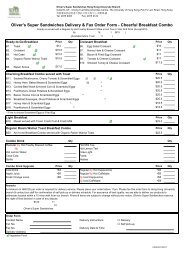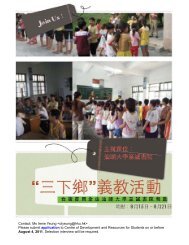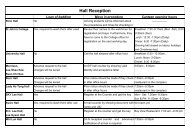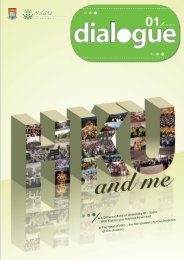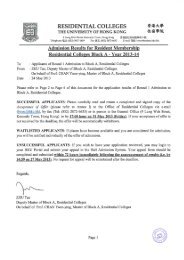April, 2011 - Cedars - The University of Hong Kong
April, 2011 - Cedars - The University of Hong Kong
April, 2011 - Cedars - The University of Hong Kong
You also want an ePaper? Increase the reach of your titles
YUMPU automatically turns print PDFs into web optimized ePapers that Google loves.
issue<br />
03<br />
2010-<strong>2011</strong><br />
Cover Story / Some like it hot – and busy!<br />
<strong>University</strong> Issues / An environment where research talent can bloom<br />
Up Close and Personal / Be sure to enjoy the ride
page<br />
In This Issue dialogue03 2010-<strong>2011</strong><br />
contents<br />
Cover Story<br />
03-04<br />
05-07<br />
08<br />
10<br />
Some like it hot – and busy!<br />
<strong>University</strong> Issues:<br />
Undergraduate Research<br />
11<br />
I know what you did last summer –<br />
but what did I do?<br />
Travelling is its own reward<br />
How to get the most from your summer<br />
Tips from CEDARS for your summer<br />
09 Summer Experience<br />
Drawing: A Different Summer –<br />
Spread Love. Love Life.<br />
An environment where research talent<br />
can bloom<br />
12 Research – it’s about discovery and selfdiscovery<br />
13-14 Getting your teeth into some research<br />
Peering through the keyhole that<br />
unlocks the universe<br />
Up Close and Personal<br />
15<br />
Be sure to enjoy the ride<br />
Dialogue in Dialogue<br />
16-17 Youth rekindles hope in Tunisia and Egypt<br />
Photo Story<br />
18 Passion<br />
Reach Up to the Stars<br />
19-22 Banners to bags<br />
Constructive move for construction<br />
industry<br />
A whole heart for sport and study<br />
A chilli topic for a hot presentation<br />
Students’ Corner<br />
23-24 Queenstown: an ambience <strong>of</strong><br />
mountains and lakes<br />
Drawing: Pastel Landscape with Poppies<br />
Dialogue<br />
Published by Centre <strong>of</strong> Development and Resources<br />
for Students, <strong>The</strong> <strong>University</strong> <strong>of</strong> <strong>Hong</strong> <strong>Kong</strong><br />
Address<br />
3/F & 4/F, Meng Wah Complex<br />
Pokfulam Road, <strong>Hong</strong> <strong>Kong</strong><br />
Website<br />
http://cedars.hku.hk<br />
Telephone (852)2857 8387<br />
Email Address cedars-programmes@hku.hk<br />
Design<br />
Bingo Communication Co.<br />
Please circulate this publication<br />
when you finish reading
Cover Story<br />
page03<br />
Some like it hot – and busy!<br />
Annie Tai<br />
Journalism, Year 3<br />
Cecilia Koo<br />
Comparative Literature, Year 3<br />
Summer – the season reminds us <strong>of</strong> heat and holidays, but it can also be a period <strong>of</strong> opportunity. During<br />
summertime we have a long break to escape from our heavy workloads. As students, summer vacation is<br />
a time for fun, but we can be productive at the same time since there are loads <strong>of</strong> activities we can join in,<br />
or even organise ourselves. <strong>The</strong> most exciting part is probably that most <strong>of</strong> our summer stories have similar<br />
starts, but the endings are always unique from each other; different events lead to different fruitful rewards.<br />
So we could know what you did last summer, and your plans for the next, CEDARS walked around the<br />
campus and grabbed several interesting stories to share. Here are some <strong>of</strong> those summer stories.<br />
Tiffany Hui, French, Year 3<br />
I joined an internship at an<br />
amusement park in South<br />
Carolina, US. I took a position<br />
as a “Food and Beverage<br />
I n t e r n a t i o n a l A s s o c i a t e ” .<br />
Although it sounds grand I<br />
helped to run a restaurant in the<br />
park, which was quite tiring! It<br />
was about 40 degrees in the<br />
summer! However I made great<br />
friends from the town, who<br />
were mostly African-Americans.<br />
I made friends with a bunch<br />
<strong>of</strong> Singaporeans too! I hope I<br />
can visit them later in the next<br />
summer. After the internship<br />
I travelled around the US and<br />
visited place like Los Angeles,<br />
Las Vegas and New York City.<br />
It was all a bit <strong>of</strong> an adventure,<br />
since I did not have time to<br />
make a very good plan!<br />
Kathy Au, English and Translation, Year 3<br />
Vivian Cheng, Geography and<br />
Comparative Literature, Year 3<br />
I did not make a concrete plan for last summer until I received an email<br />
about an internship to China through the New World New Youth Internship<br />
programme, organised by <strong>Hong</strong> <strong>Kong</strong> Youth Association. So I spent a<br />
month and a half in Beijing, working in the former residence <strong>of</strong> Soong<br />
Ching-ling, also known as Madame Sun Yat-sen. To my surprise, the<br />
working atmosphere in Beijing is quite different from <strong>Hong</strong> <strong>Kong</strong>. Things<br />
were much more laid back. Interns did not have much to do, so we could<br />
explore the city more! We shopped like Beijingers, ate like Beijingers and<br />
lived like Beijingers! It was an enriching experience.<br />
I spent last summer in three different places: Manchester, Yunnan and <strong>of</strong><br />
course, <strong>Hong</strong> <strong>Kong</strong>. I was only staying behind in Manchester for a few<br />
days after my exchange programme. <strong>The</strong> best part <strong>of</strong> the break was my<br />
field trip in Yunnan province. It was about 10 days, but I got to see what<br />
tourism had done for the natural landscape <strong>of</strong> the province. This trip was<br />
like an alternative kind <strong>of</strong> tour: I visited some famous spots, but in my<br />
mind was the conflict between economic development and environmental<br />
protection. This trip certainly helped me learn a lot. Sometimes, you really<br />
need to take these trips to get you thinking.<br />
Li Zhihua, Chinese Language and Literature,<br />
Year 2 (exchange from Sun Yat-sen <strong>University</strong>)<br />
I had military training last summer, which was really not a vacation<br />
for me! Basically, military training is compulsory. <strong>The</strong> training started<br />
at six every morning. <strong>The</strong> first thing to do was just standing like army<br />
men, which meant that moving and talking were not allowed. <strong>The</strong><br />
sun was scorching later in the day, and unsurprisingly, my skin got<br />
burnt. So I was allowed to attend the training only in the evening. In<br />
the evening, everyone went to the playground and sat down. Soldiers<br />
came and taught military songs. I was very forgetful and couldn’t<br />
remember a single song then! <strong>The</strong>re was a great moment when I<br />
was surrounded by the sound<br />
<strong>of</strong> singing, and I kept chatting<br />
with my best friend secretly and<br />
appreciating the beautiful stars in<br />
the dark sky.<br />
This summer, I plan to go to the<br />
ancient town <strong>of</strong> Lijiang in Yunnan<br />
province. I feel really fortunate that<br />
the military training is over forever,<br />
for I have had this kind <strong>of</strong> training<br />
ever since primary school. Now it<br />
is ended finally. Wonderful!
page<br />
Su Xinqi, Journalism, Year 2<br />
(from Mainland China)<br />
Cover Story dialogue03 2010-<strong>2011</strong> my ability to speak, write, read and listen to Korean language because<br />
Tingo Lam, Social Sciences, Year 3<br />
My birthday is during summer holidays, and two years ago I decided<br />
to live out my birthday wish <strong>of</strong> entrepreneurship and started my own<br />
business. Since then, I have been working on my boutique in Tsim<br />
Sha Tsui, which sells women’s accessories. Spending the past couple<br />
<strong>of</strong> years learning how to get my business on track and gradually<br />
earning customer trust have been the source <strong>of</strong> my happiness. I love<br />
my shop and I am going to treat the business as my full-time career<br />
after graduation.<br />
Last summer, I had a twomonth<br />
internship in a local nonpr<strong>of</strong>it<br />
organisation (NPO) that<br />
provides pro-bono consultation<br />
and training for other nonpr<strong>of</strong>it<br />
organisations. My job was<br />
mainly researching about their<br />
market and making a mass<br />
media promotion plan. It was<br />
the first time for me to be so<br />
close to NPOs and it taught me<br />
a lot about their responsibilities,<br />
functions and difficulties. This<br />
summer I am planning to get<br />
an internship in a news agency.<br />
Also I would love to spend<br />
some time travelling around,<br />
which is one <strong>of</strong> my biggest<br />
hobbies.<br />
Trista Hung,<br />
International Business and Global Management, Year 3<br />
Last summer I had an adventure across Europe and the UK following<br />
my exchange in Scotland. It was pretty interesting because there<br />
were many critical and unexpected moments where I had no one<br />
but myself to count on. I found myself facing situations like getting<br />
trapped in a train station after midnight and finding my way out <strong>of</strong><br />
a city with almost no one speaking English. It was a true test <strong>of</strong> my<br />
independence and adaptability to a new environment and I felt like the<br />
not-very-smart but lucky and optimistic heroine in an adventure novel.<br />
This summer I’m hoping to continue my adventure with the Australian<br />
WWOOF programme, which<br />
i s a b o u t w o r k i n g o n a n<br />
organic farm in return for free<br />
accommodation, food and a<br />
unique experience with the local<br />
host. It will be my last chance<br />
to capture some beautiful<br />
moments as a student. I hope it<br />
will mark a great ending to my<br />
university journey.<br />
Mayo Kishimoto, Psychology<br />
and Sociology, Year 3<br />
Every summer I try to do something productive, since we have about<br />
three months break. Last summer, for example, I went to intern for<br />
People for the Ethical Treatment <strong>of</strong> Animals (PETA) in the East coast <strong>of</strong><br />
the US. It was very memorable, living with other interns and participating<br />
in outreach events and so on. This year, I'll be spending two months in<br />
Cambodia with Migrant Outreach Education Initiative (MOEI) to teach<br />
migrant students. I can hardly wait!<br />
Wong Pheak Zern, Journalism,<br />
Year 3 (from Malaysia)<br />
Last summer I was working as an<br />
intern at <strong>The</strong> Standard newspaper<br />
for one month, and it was a fun<br />
and fruitful experience as I got to<br />
know a lot <strong>of</strong> working adults, away<br />
from the people I normally meet in<br />
school – students and pr<strong>of</strong>essors.<br />
After the internship I went to South<br />
Korea for a month to join the<br />
summer language programme at<br />
Yonsei <strong>University</strong> in Seoul. It was<br />
a perfect opportunity to improve<br />
every day I could practise speaking to Koreans, listening to their<br />
conversation, reading street signs or menus in restaurants and writing<br />
essays in class. For the coming summer vacation, I think I’ll be heading<br />
back to Singapore to look for a job, as I am graduating soon. Someone<br />
asked the reason why I am not staying in <strong>Hong</strong> <strong>Kong</strong> for my career,<br />
and I answered: “<strong>Hong</strong> <strong>Kong</strong> is good <strong>of</strong> course, but I want to work in a<br />
country where I can get home easily, and it only takes me seven hours<br />
by bus to go back to Malaysia from Singapore.”
Cover Story<br />
I know what you did last summer –<br />
but what did I do?<br />
Angie Leung<br />
Arts, Year 3<br />
For Dr Tsing Nam-kiu, a lecturer with the Department <strong>of</strong> Mathematics, summertime is<br />
fruitful when a person does something that allows him or her to take a good look at<br />
themselves and where they are – and improve themselves in the ways they want.<br />
In the summer before he first attended HKU, Dr Tsing spent his time in more or less the<br />
same way that many students do now. He got a job as a private tutor and read a lot,<br />
mostly English novels and Chinese martial arts fiction. But when he discovered a keen<br />
interest in films in the undergraduate years that followed, he devoted most <strong>of</strong> his free time<br />
to his passion. In his first summer, apart from gaining a better knowledge in Mathematics<br />
by reading books on the topic outside the curriculum, he learned film-making in a<br />
workshop organised by the Film Society. He also learned computer programming in a<br />
summer class held by the Computer Society and organised an electronics project class<br />
for fellow students in his capacity as a committee member <strong>of</strong> the Electronics Society.<br />
In the summer <strong>of</strong> Year 2, he became a core member <strong>of</strong> Independent Clubs Association<br />
(ICA) and was on the committee <strong>of</strong> the orientation programme. He shot 8mm films that<br />
promoted various clubs within the ICA and worked as a one-man post-production team.<br />
He also shared his skills in film making with other students. “Assisting in film production<br />
was a new and exciting experience to me,” Dr Tsing says. His first experimental animation,<br />
called Multiples <strong>of</strong> Six, took him three days in production, and he later submitted the short<br />
to an independent film competition, and won an award for his efforts. <strong>The</strong> animation is<br />
about Mathematics – you can view it at http://www.youtube.com/watch?v=YoIxprVRCbc.<br />
In his final year <strong>of</strong> undergraduate studies, Dr Tsing was even more devoted to the ICA as<br />
its new president. He continued to prepare and organise orientation activities.<br />
He says there is no rule for spending a meaningful summer – the most important thing is<br />
to do something that “allows oneself to self-examine”. In this way, a person can improve<br />
oneself and learn more. “Summer can be spent in different ways, for example, working for<br />
a company, volunteering, or even concentrating on reading a vast amount <strong>of</strong> books and<br />
discussing its content with friends,” he says. <strong>The</strong> Mathematics Department also <strong>of</strong>fers<br />
summer intern positions, like student research assistants, in which students can take part<br />
in research or course preparation.<br />
...there is no rule for<br />
spending a meaningful<br />
summer – the most important<br />
thing is to do something<br />
that ‘allows oneself to selfexamine’.<br />
Dr Tsing Nam-kiu<br />
Department <strong>of</strong> Mathematics
page<br />
Cover Story dialogue03 2010-<strong>2011</strong><br />
Travelling is its own reward<br />
Angie Leung<br />
Arts, Year 3<br />
“Get away from where you are from. Go and travel on your own, and experience the<br />
diverse cultures <strong>of</strong> different parts in the world.” That’s the advice that Dr David Pomfret,<br />
an associate pr<strong>of</strong>essor in Modern European History, gave to our fellow students. In<br />
other words the old adage that “travel broadens the mind” can be your mantra this<br />
summer.<br />
Dr Pomfret believes that a person grows and learns the best in places outside their<br />
comfort zones. Paying visits to remote places may bring unforeseen problems, but<br />
he believes that this is the way a person builds confidence and personality. Through<br />
travelling, a person is exposed to new ideas and out-<strong>of</strong>-context thoughts. Travellers<br />
also learn to be independent and make decisions on their own. “This is especially<br />
true to students in <strong>Hong</strong> <strong>Kong</strong>, in particular to those enjoying a world-class education<br />
and from a privileged background, that they should really consider getting away from<br />
pressure to enjoy a cultural shock elsewhere in the world,” he says.<br />
During his undergraduate years, Dr Pomfret joined work camps organised by the<br />
Christian Movement for Peace and travelled to France and East and Central Europe<br />
for several weeks at a time. In the work camps, he met people struggling in life and<br />
communicated with them. For example, in East Germany, he visited rural communities<br />
and helped in the reconstruction <strong>of</strong> a windmill. “We had no skills at that time. What we<br />
could do was basically manual work like digging, moving rocks and bricks,” he says.<br />
During his visit to France, he learned some French and this enticed him to teach himself<br />
French, and ultimately to pursue the study <strong>of</strong> French history.<br />
Get away from where<br />
you are from. Go and<br />
travel on your own, and<br />
experience the diverse<br />
cultures <strong>of</strong> different<br />
parts in the world.<br />
Although your summer plans are up to you, there are many fun and exciting things<br />
on the agenda in the new curriculum. <strong>The</strong>re are several programmes under plan at<br />
the Department <strong>of</strong> History. One <strong>of</strong> them is to organise field trips to Europe. Funded<br />
endowments will be provided to History majors as subsidies <strong>of</strong> their expenses on these<br />
field trips. <strong>The</strong>re will also be an internship course available with a publisher. <strong>The</strong> third<br />
summer activity, called History beyond Borders, allows students who get approval from<br />
the department to participate in a history project. Participants will be awarded a sum<br />
<strong>of</strong> cash for their project expenses. <strong>The</strong>se students are also required to present their<br />
papers and history journals after the event.<br />
Dr David Pomfret<br />
Department <strong>of</strong> History
Cover Story<br />
page<br />
How to get the most from your summer<br />
Winnie Cheng<br />
History and Geography, Year 3<br />
In order to have a fruitful summer, planning and preparation are important. Pr<strong>of</strong>essor<br />
Bennett Yim suggests students should have a clear objective before planning their<br />
summer. Students also should choose activities according to their own resources<br />
– their abilities, qualifications, knowledge, money etc. For instance, Year 1 students<br />
can more or less enjoy their holidays, since they do not have to search for jobs. <strong>The</strong>y<br />
can make use <strong>of</strong> summer time to deepen their understandings in their majors, or<br />
participate in community services.<br />
For Year 2 students, some sort <strong>of</strong> career preparation is in order. As an Associate<br />
Director <strong>of</strong> the Chinese Management Centre at the Faculty <strong>of</strong> Business and<br />
Economics, Pr<strong>of</strong>essor Yim says internship is very important for Business students.<br />
“Apart from internship opportunities, our faculty introduced a Business Consulting<br />
Practicum three years ago,” he says. “We hire an experienced consultant to lead<br />
10 groups <strong>of</strong> students, so as to provide a consultancy service to some small and<br />
medium-sized companies and social enterprises. Students can gain experience<br />
in helping companies to conduct consumer surveys, select countries for market<br />
expansion, design accounting systems, develop company websites, etc.”<br />
Travel is another activity that Pr<strong>of</strong>essor Yim suggests, as travel can broaden one’s<br />
horizon. “Students can also pay attention to the cultural and economic development<br />
in countries when they go travel.” When he was a Year 2 student, Pr<strong>of</strong>essor Yim<br />
used his summer holiday to travel through as many parts <strong>of</strong> China as he could, at a<br />
historic time when the Mainland was opening up to the world.<br />
“We chose China because China was opening up at that time. We were curious<br />
about China so we decided to explore the lives <strong>of</strong> the Chinese people,” he says.<br />
“Nowadays, we can plan our trip easily, but back then it was difficult to do all the<br />
preparations. We tried to use the least resources to visit as many places as we<br />
could. It was an unforgettable trip – as I remember we still had to use food coupon<br />
to buy food.”<br />
Such trips and memories are the kind that stay with you forever, as Pr<strong>of</strong>essor Yim<br />
can attest. Your summer holidays may be the last long holiday before you enter the<br />
‘real world’, so using it in the best possible way, and planning ahead as Pr<strong>of</strong>essor<br />
Yim advises, will ensure you get the most out <strong>of</strong> the precious time.<br />
Your summer holidays may<br />
be the last long holiday<br />
before you enter the ‘real<br />
world’, so using it in the<br />
best possible way…<br />
Pr<strong>of</strong>essor Bennett Yim<br />
Faculty <strong>of</strong> Business and Economics
page<br />
Cover Story dialogue03 2010-<strong>2011</strong><br />
Tips from CEDARS for your summer<br />
Winnie Cheng<br />
History and Geography, Year 3<br />
It’s never too late to think about how to spend your summer vacation, as long as you have planning in mind. <strong>The</strong> variety <strong>of</strong> services and<br />
programmes <strong>of</strong>fered by CEDARS can give you some ideas on how to turn the long break into a fond memory <strong>of</strong> your university life! (Website<br />
<strong>of</strong> CEDARS: http://cedars.hku.hk)<br />
Enrich campus life<br />
<strong>The</strong>re are plenty <strong>of</strong> student societies in the university, and they <strong>of</strong>ten<br />
organise lots <strong>of</strong> summer activities including, but not limited to, orientation<br />
programmes and service trips. Visit the website <strong>of</strong> “Student Life and<br />
Resources” (http://wp.cedars.hku.hk/web/studentlife) to know more about<br />
the societies and how the university supports them. A fruitful university life<br />
should be free <strong>of</strong> boundaries. Stay tuned to the website <strong>of</strong> the Campus<br />
Life Section <strong>of</strong> CEDARS for all sorts <strong>of</strong> activities organised by external<br />
bodies. It’s a good choice to participate in some <strong>of</strong> these activities during<br />
your summer holiday!<br />
Prepare for your future career<br />
Summer holiday is a good time to prepare and think <strong>of</strong> your future career. You can find all sorts <strong>of</strong><br />
information about careers in the website <strong>of</strong> CEDARS-Careers and Placement Section. Early preparation<br />
for your career is always useful. Advice on how to prepare your CV can be found on the website. If you<br />
are a freshman at university or you just want to talk about career planning with new students during<br />
your orientation activities, you may find your career interest by using the Prospects Planner. If you are<br />
looking for summer jobs and internships, you definitely don’t want to miss the website <strong>of</strong> NETjobs.<br />
Also, keep an eye on the constant updates <strong>of</strong> recruitment news on campus.<br />
Refresh yourself and learn to cope with situations<br />
Want to learn a bit more about yourself? Do a self-assessment on the “Psychometer” (http://psyax.cedars.hku.hk)<br />
provided by CEDARS-Counselling and Person Enrichment (CoPE) Section to learn more about: Character<br />
Strengths; Learning and Study; Mood and Stress; <strong>University</strong> Adjustment; Relationships; and Personality and Traits.<br />
Tips about time management, study, friendships and even love can be found on the website <strong>of</strong> CoPE. During the<br />
summer, when you are less busy with schoolwork, it might be a good time to work on your personal difficulties or<br />
find ways to improve yourself by making an appointment to meet with a counsellor. Students with a disability can<br />
also approach CEDARS for accessibility support for your learning needs and university adjustment.<br />
Make a contribution to the community<br />
How about making use <strong>of</strong> summer to contribute to society? HKU Service Network<br />
(http://cedars.hku.hk/ServiceNetwork) is a platform for students to acquire service<br />
opportunities, information on funding sources and project advice. It is also a dynamic network for<br />
students and community service partners to exchange service needs and assistance. CEDARS<br />
administers several funding avenues to assist student projects, such as the HKU ’82 Alumni Green<br />
Fund and the Gallant Ho Service Learning Scheme – Family Values. Interested students can<br />
also be an Instructor in the Non-Academic Induction Programme organised by CEDARS for new<br />
students, and share their experiences with the new guys. Stay tuned to their announcements.
Cover Story<br />
Summer Experience<br />
Ng Aloysius Hon-bon<br />
Nursing, Year 3<br />
<br />
Annie Li Man<br />
Law, Year 5<br />
This photo was taken at Huangshan in May 2010. This was<br />
my first time visiting China. My girlfriend and I were there<br />
with her friends for 11 days and this was day two <strong>of</strong> the<br />
trip. It had just stopped raining before I took this photo.<br />
<br />
I took this on a<br />
ferry on my way<br />
from the French<br />
Mediterranean island<br />
<strong>of</strong> Corsica to Nice<br />
on the southern<br />
coast <strong>of</strong> France in<br />
late June 2010. It<br />
was the last <strong>of</strong><br />
my trips during my<br />
exchange year.<br />
Florence Li Yan-pui<br />
International Business and<br />
Global Management, Year 3<br />
<br />
I met this child in<br />
Keukenh<strong>of</strong> Garden, in the<br />
Netherlands, last summer.<br />
Are you curious about<br />
everything too?<br />
Isaac Mak Kit-kwan<br />
Economics and Finance, Year 3<br />
BBA(Law), Year 3<br />
Danny Law Man-tsun<br />
I was backpacking in Vietnam when I saw<br />
this baby stray cat starving, on the verge<br />
<strong>of</strong> death. Out <strong>of</strong> curiosity, I stopped,<br />
and then decided to take this little fellow<br />
with me travelling from Ho Chi Minh City<br />
to Hanoi, and finally I found an adoption<br />
house for her.<br />
<br />
I took this atmospheric photo <strong>of</strong><br />
members <strong>of</strong> Union Choir preparing<br />
for a recital performance at CYM<br />
<strong>The</strong>atre in summer 2009.
page10 <strong>University</strong> Issue dialogue03 2010-<strong>2011</strong><br />
A Different Summer – Spread Love. Love Life.<br />
Stephanie Wong<br />
BBA(Law), Year 3
<strong>University</strong> Issues: Undergraduate Research<br />
page11<br />
An environment where<br />
research talent can bloom<br />
Nelson<br />
Siu<br />
Law, Year 5<br />
When Pr<strong>of</strong>essor Amy Tsui, Pro-Vice-Chancellor <strong>of</strong> Teaching and Learning, spoke with Dialogue about the<br />
educational aims <strong>of</strong> HKU, she was particularly focused on a shift in the <strong>University</strong>’s approach to the concept<br />
<strong>of</strong> education. Conventional classroom learning is not sufficient in this day and age, so HKU is progressively<br />
reforming students’ educational experience with an emphasis on “experiential learning”.<br />
Weaving seamlessly with this philosophy <strong>of</strong> “experiential learning” is the planned launch <strong>of</strong> the HKU<br />
Undergraduate Research Fellowship Scheme. Undergraduate students who are admitted into the Fellowship<br />
Scheme will have the opportunity to be involved in pr<strong>of</strong>essional research work. A variety <strong>of</strong> research-related<br />
experience is <strong>of</strong>fered by the Fellowship Scheme: an admitted student may work on his own thesis, be<br />
involved in research conducted by academic staff at the <strong>University</strong> and even go abroad to participate and<br />
possibly present papers in international academic conferences. Clearly, this is not your ordinary summer<br />
programme; this is participation in real-life research. <strong>The</strong> emphasis is to provide select undergraduates with<br />
first-hand exposure to scholarship <strong>of</strong> research. Those who participate in the Fellowship Scheme will get a feel<br />
<strong>of</strong> what it is like to contribute to research work that has practical applications for the progress <strong>of</strong> society.<br />
Pr<strong>of</strong>essor Amy Tsui speaks about<br />
the plan <strong>of</strong> the <strong>University</strong> to<br />
groom undergraduate students<br />
who have potential in research.<br />
Another aspect <strong>of</strong> the Fellowship Scheme is the creation <strong>of</strong> an environment where research talent can<br />
bloom. Many students do not think about pursuing postgraduate research until the concluding years<br />
<strong>of</strong> their undergraduate studies. This is where the Fellowship Scheme jumps in to resolve this belated<br />
consideration. <strong>The</strong> Fellowship Scheme is largely designed for students who are in the second or third year<br />
<strong>of</strong> their undergraduate career. By providing opportunities for these undergraduates to engage in authentic<br />
research work, the scheme encourages students who have the potential and passion for research to think in<br />
advance and consider a career in academia. In fact, a student who performs outstandingly in the Fellowship<br />
Scheme may even be <strong>of</strong>fered early admission into a postgraduate programme. <strong>The</strong> Fellowship Scheme has<br />
a research-fostering nature which adheres to HKU’s commitment to advancing quality research. Pr<strong>of</strong>essor<br />
Tsui says that the Fellowship Scheme aims to “nurture the next generation <strong>of</strong> researchers”. <strong>The</strong>re really is no<br />
better way to put it.<br />
<strong>The</strong> Fellowship Scheme will also <strong>of</strong>fer a distinct set <strong>of</strong> resources that admitted students can tap into. Firstly,<br />
each admitted student will be assigned to one academic staff member from their discipline. This means that<br />
each fellow will have one-on-one guidance and mentorship from a research specialist. Secondly, in certain<br />
circumstances, HKU is prepared to provide funding and grant stipends to admitted students for any research<br />
expenditure or for an overseas trip to an academic conference. Of course, these privileges are only available<br />
to the selected students who are admitted into the Fellowship Scheme. <strong>The</strong> admission criteria will be quite<br />
demanding because the Fellowship Scheme is, after all, a vehicle for discovering and actualising research<br />
potential and talent. Academic excellence will definitely be taken into account when considering admissions,<br />
but it is not the sole deciding factor. <strong>The</strong> Fellowship Scheme is looking for students who are informed by<br />
their curiosity, students who do not take things at face value, but instead, critically evaluate and question the<br />
status quo.<br />
So, if you have a passion for research and believe that you have the capacity to be involved in pr<strong>of</strong>essional<br />
research, but you are somewhat uncertain about a career in postgraduate research, the Undergraduate<br />
Fellowship Scheme may be your chance to explore this field <strong>of</strong> work. Who knows? This might be your calling.<br />
You will never know until you learn by participating.
page<br />
<strong>University</strong> Issues: Undergraduate Research dialogue03 2010-<strong>2011</strong><br />
Research – it’s about discovery and<br />
self-discovery<br />
Cecilia Koo<br />
Comparative Literature, Year 3<br />
Academic research almost sounds like the underworld for some undergraduates – the image <strong>of</strong> researchers<br />
hidden away for endless hours in dark libraries or laboratories comes to mind. Hardly the true picture <strong>of</strong><br />
academic research, but nonetheless we ask Pr<strong>of</strong>essor Vivian Yam from the Department <strong>of</strong> Chemistry to<br />
shed some light on an <strong>of</strong>ten misunderstood field <strong>of</strong> endeavour.<br />
Pr<strong>of</strong>essor Yam received international recognition recently after she received the <strong>2011</strong> L'Oréal-UNESCO<br />
Women in Science Awards in early March. Every great success starts from a little beginning, so where did<br />
she start on her road to research?<br />
“<strong>The</strong>re was no epiphany. I was just following my interest in research,” Pr<strong>of</strong>essor Yam says, adding it was<br />
the freedom <strong>of</strong> research that first stimulated her. “It is very different from working for private companies,<br />
since you are not allowed to explore where your interest truly lies.”<br />
Working on your own areas <strong>of</strong> interest is an ideal picture for most students. Nonetheless, the perception<br />
is that it’s lonely work … is that the case? “What I mean by ‘loneliness’ is that it’s difficult for the general<br />
public to fully understand what we are doing; it’s hard to explain to them,” says Pr<strong>of</strong>essor Yam with a<br />
cheerful smile. “We also have colleagues to work with!”<br />
However, she says when problems and obstacles arise during research, your own personal qualities are<br />
still challenged. “<strong>The</strong>re will be many ups and downs, and you need to come up with [your own] solutions.”<br />
Pr<strong>of</strong>essor Yam says it is very important for researchers to take failure in their stride. “I always tell my<br />
students to take failure in a positive way. <strong>The</strong> most important thing is not to be overwhelmed by the act <strong>of</strong><br />
failing, but to think about the solution. <strong>The</strong> development <strong>of</strong> this positive attitude towards problem solving is<br />
one <strong>of</strong> the biggest rewards and assets that one can gain at the end <strong>of</strong> the research.”<br />
Pr<strong>of</strong>essor Yam prefers to connect scientific research with daily lives to make students realise the usefulness<br />
<strong>of</strong> the field <strong>of</strong> chemistry. “Many things we are enjoying are closely related to chemistry,” she says, reminding<br />
that modernisation is the outcome <strong>of</strong> yesterday’s research. Scientific research is related to almost every<br />
part <strong>of</strong> our daily lives. “That’s why I think scientists should communicate with the general public more,<br />
to explain what we are doing.” <strong>The</strong> pr<strong>of</strong>essor reels <strong>of</strong>f numerous things around us that are the results <strong>of</strong><br />
chemistry, from medicines to LCD monitors to swimsuits that work like a shark’s skin. “Chemistry is applied<br />
in many ways; it is found everywhere in our lives, but we seldom pay attention to it,” she says.<br />
Pr<strong>of</strong>essor Yam talks about<br />
how students can learn<br />
from doing research.<br />
For students who want to be researchers, Pr<strong>of</strong>essor Yam insists interest should come first. “Never do<br />
research just for the sake <strong>of</strong> getting a higher degree only. Interest should always be the first priority, in<br />
addition to one’s own ability,” she advises. Finally, she reminds young researchers not to give up easily.<br />
“<strong>The</strong>re would not be any excitement if everything goes as planned. Don’t be afraid <strong>of</strong> failure; you can never<br />
know whether the unexpected findings can lead to a new discovery or realm <strong>of</strong> science. A lot <strong>of</strong> important<br />
discoveries come from serendipity. In the end, the reward will be bigger than you can imagine.”
<strong>University</strong> Issues: Undergraduate Research<br />
Getting your teeth into some research<br />
<strong>The</strong> Year 4 Dental Surgery student Jack Ji Chao joined the<br />
Undergraduate Research Project launched by the Faculty <strong>of</strong> Dentistry<br />
when he was in Year 3. <strong>The</strong> project is open to all Bachelor <strong>of</strong> Dental<br />
Surgery (BDS) students who want to be involved in dental research.<br />
“I didn’t really have a clear idea about how dental research is carried<br />
out, so I took part in this project with the aim <strong>of</strong> getting a better idea<br />
<strong>of</strong> what makes up dental research, apart from the routine clinical<br />
experience we get from the normal BDS curriculum,” he says.<br />
At the 24th annual scientific meeting <strong>of</strong> the International Association for<br />
Dental Research – South-East Asian division (IADR-SEA) held in Taiwan<br />
in September 2010, Jack presented the research <strong>of</strong> his team, which consisted <strong>of</strong> another undergraduate<br />
student from the faculty, supervisors Dr Seneviratne Chaminda Jayampath, Dr X. Li and Pr<strong>of</strong>essor L.J. Jin,<br />
as well as technical experts at the faculty.<br />
“<strong>The</strong> project was about non-surgical periodontal treatment, or in layman’s terms, scaling ( 洗 牙 ). Fortunately,<br />
I won first place <strong>of</strong> the Division Travel Award Competition Junior Category, and represented the South-East<br />
Asian division at the IADR main conference in San Diego, United States, in March <strong>2011</strong>.”<br />
Jack and his team investigated the effect <strong>of</strong> this treatment from clinical, microbiological and immunological<br />
levels, aiming to reveal the reasons behind the clinical success <strong>of</strong> this treatment. “Through the research, we<br />
also detected a certain cytokine present in saliva for the first time, which may provide a new biomarker for<br />
periodontal disease detection,” he says.<br />
“Doing research during an undergraduate study is full <strong>of</strong> challenges. Time management was a huge<br />
obstacle, as the BDS curriculum itself is very intense, and we needed to use our after-school time to carry<br />
out the research. <strong>The</strong> laboratory work deals with delicate experiments on a<br />
molecular level, so even a very tiny mistake can destroy the final experiment<br />
result and the whole procedure would have to be re-done.<br />
“We put loads <strong>of</strong> effort in the project and got great support from our<br />
supervisors and many faculty members who instructed us to help solve<br />
the problems. What we gained is that we performed such laboratory<br />
experiments that we previously had only learned from text books. Moreover,<br />
we consolidated our clinical knowledge through examining the mechanism<br />
per se <strong>of</strong> the treatment. And the analysis <strong>of</strong> the data helped trained our critical<br />
thinking.”<br />
Dentistry is a pr<strong>of</strong>essional curriculum that requires pr<strong>of</strong>icient skills and solid<br />
knowledge. “By fostering the interest in research, we were able to lay down<br />
a solid knowledge base on which hands-on skills are built,” Jack says. “In<br />
future, I would love to develop more creativity in research designing and data<br />
analysis.”
page<br />
14 <strong>University</strong> Issues: Undergraduate Research dialogue03 2010-<strong>2011</strong> To Xinyu, research combines<br />
Peering through the keyhole<br />
that unlocks the universe<br />
Last summer, the Year 2 Mathematics / Physics student Li Xinyu carried out<br />
a summer research at Mullard Space Science Laboratory, <strong>University</strong> College<br />
London. <strong>The</strong> project was supported by the <strong>University</strong> <strong>of</strong> <strong>Hong</strong> <strong>Kong</strong>’s Department<br />
<strong>of</strong> Physics and the Faculty <strong>of</strong> Science under the Overseas Research Fellowship<br />
scheme.<br />
In order to encourage students to enrol in the research work, the Faculty <strong>of</strong><br />
Science established this scheme to give them any support they need. Students<br />
need to submit a research proposal with their application, and attend an interview.<br />
“Luckily, I got the chance to receive the fellowship last year, and it turned out to be<br />
very precious to me,” Xinyu says.<br />
<strong>The</strong> result <strong>of</strong> simulation - the bright spots are<br />
galaxies and galaxy clusters.<br />
<strong>The</strong> laboratory is located in quiet countryside near London. “It’s wonderful for<br />
research, because there is nothing but a beautiful view to disturb you,” Xinyu<br />
says. Xinyu’s project involved the origin <strong>of</strong> “cosmological magnetic fields”. As a<br />
common sense, he explains, the earth has a magnetic field. Observations show<br />
that there are magnetic fields not only in planets and stars, but also in galaxies<br />
and the intergalactic medium (a sparse gas that extends between the galaxies <strong>of</strong><br />
the universe). Magnetic fields may play a vital role in the formation and evolution <strong>of</strong><br />
structures in the universe like galaxies.<br />
How these magnetic fields were formed is a mystery, but unravelling that mystery is essential to studying the formation and evolution <strong>of</strong><br />
the universe. “<strong>The</strong> understanding <strong>of</strong> it will equip us with better knowledge <strong>of</strong> the magical universe that we live in,” Xinyu says.<br />
“My project was to investigate the origin <strong>of</strong> the fields. At present, there are two scenarios <strong>of</strong> the field generation: top-down and bottomup.<br />
<strong>The</strong> magnetic fields are formed from large-scale to small-scale in the former scenario, and vice-versa in the latter.”<br />
<strong>The</strong>re are many models about the detailed mechanism for field generation under these two scenarios, Xinyu explains, but his own<br />
research investigated the field generation from a galaxy formation in the top-down scenario.<br />
“I did the simulation and induced a magnetic field structure from it. Although the results seemed to be not so<br />
deep, it convinced me that I could do my job in exploration <strong>of</strong> this nature, and it <strong>of</strong>fered me great joy when I<br />
first obtained them,” he says. “<strong>The</strong> programme also benefited me in many other aspects. <strong>The</strong> experience on<br />
how research work was conducted was valuable. <strong>The</strong>re were times <strong>of</strong> impatience, when you had to do the<br />
dirty work and wait several days for the results from computers; and there were also times <strong>of</strong> difficulty, when<br />
you got stuck. But they were part <strong>of</strong> the joy <strong>of</strong> discovery, and only after you have gone through and overcome<br />
them, you may reach the happiness <strong>of</strong> finding out.”<br />
Apart from the project, Xinyu attended lectures, seminars and gave journal club talks during his UK stay. “<strong>The</strong><br />
various activities broadened my horizon on the cutting-edge <strong>of</strong> science that was being pursued,” he says. “It<br />
was exciting to find so many things to discover and I was on the same level with those researchers – we were<br />
all at the gate <strong>of</strong> the knowledge locked behind.<br />
“I really value this opportunity to do this summer research in my undergraduate life. It gave me experience, as<br />
well as practical knowledge. It is important for an undergraduate student to do some research, from my point<br />
<strong>of</strong> view. He can explore more, experience the hardships and the joy, and have more choices when he decides<br />
his future career.<br />
“For me, I would be very willing to take research as a career to continue exploring this mysterious universe.”<br />
the joy <strong>of</strong> discovery with the<br />
happiness <strong>of</strong> finding out.
Up Close and Personal<br />
page15<br />
Be sure to enjoy<br />
the ride<br />
Annie Tai<br />
Journalism, Year 3<br />
If you wake up as early as Pr<strong>of</strong>essor Roland Chin (i.e. 6am), you can<br />
probably greet him good morning while he rides his bike from Sandy Bay<br />
up to Pokfulam.<br />
“I love cycling,” says the Deputy Vice-Chancellor (DVC) and Provost<br />
<strong>of</strong> HKU with a child-like grin. “I can keep fit while enjoying the speedy<br />
adventure and scenery alongside.”<br />
Pr<strong>of</strong>essor Chin is a fan <strong>of</strong> various sports. As a teenager, he played a lot<br />
<strong>of</strong> Ping Pong and badminton. Later, when he was studying electrical<br />
engineering in the US, he took up tennis and skiing. In his 40s, he<br />
returned to <strong>Hong</strong> <strong>Kong</strong> and learned to scuba-dive. And more recently,<br />
cycling is his passion.<br />
“My biggest hobby is simply to have fun – although I don’t like boring<br />
sports, such as jogging or working out in the gym,” Pr<strong>of</strong>essor Chin<br />
says. “Ball games are fun but require booking <strong>of</strong> venues, equipment and<br />
buddies. Yet for cycling, I can do it alone and manage to fit it into my<br />
busy schedule.”<br />
And since Pr<strong>of</strong>essor Chin took up the position <strong>of</strong> DVC last September,<br />
life has been very busy. Before that, he was Vice-President for Academic<br />
Affairs and Deputy President at the <strong>Hong</strong> <strong>Kong</strong> <strong>University</strong> <strong>of</strong> Science<br />
and Technology. Now his role in HKU includes overseeing all academic<br />
affairs, including student admissions and the curriculum development for<br />
the “3-3-4” reform.<br />
“HKU students are very smart, active and eloquent,” he observes<br />
when asked for his impressions <strong>of</strong> students here, whether at chance<br />
encounters in Starbucks or high-table dinners. “HKU is highly<br />
internationalised, with students who are not limited to classroom<br />
learning, but who indeed have exposure to the rest <strong>of</strong> the world through<br />
internships and exchanges.”<br />
Compared to his days as a student, Pr<strong>of</strong>essor Chin says we are much<br />
luckier today. In the past, students studied in a structured environment<br />
with limited choices. Nowadays, we have more freedom to be flexible.<br />
Moving to the 3-3-4 education model, he says there will be more<br />
electives and experiential learning opportunities. “Young people should<br />
be bold and try more new things. <strong>The</strong>y don’t necessarily have to focus<br />
their mind on one subject. What’s more important is to follow their<br />
interests, and their heart, to be socially conscious.”<br />
Being a father <strong>of</strong> two post-80s daughters, Pr<strong>of</strong>essor Chin believes<br />
that the best way to raise children is to allow them some freedom. He<br />
encourages his kids to go backpacking around Europe after graduation<br />
and take a gap year from studies.<br />
“Parents in <strong>Hong</strong> <strong>Kong</strong> generally hold high expectations and hope that<br />
their children can be a versatile genius,” he says. “But only when children<br />
are seriously enjoying something can they be good at it. I think that it is<br />
not by rigid plans and tutorial classes, but exploration, that kids discover<br />
their interests.”<br />
For Pr<strong>of</strong>essor Chin, life is a journey full <strong>of</strong> surprises. He never planned<br />
to be a pr<strong>of</strong>essor, or a DVC. He says he failed in some <strong>of</strong> his secondary<br />
school examinations. Yet during his university life in the US, he untapped<br />
his potential and passion in computers and engineering, and from then<br />
on pursued a highly successful academic career.<br />
Every morning, Pr<strong>of</strong>essor Chin gears up and welcomes challenges on<br />
two wheels. Advice for students? “<strong>The</strong>re are always ups and downs on<br />
the road. Just remember to have fun in the adventure and follow where<br />
your heart goes.”<br />
Pr<strong>of</strong>essor Roland Chin,<br />
Deputy Vice-Chancellor<br />
and Provost
page16 Dialogue in Dialogue dialogue03 2010-<strong>2011</strong><br />
Youth rekindles hope in Tunisia and<br />
Egypt<br />
Alvin Lum<br />
BBA(Law), Year 3<br />
For decades, people in Tunisia and Egypt could never have imagined a revolution for democracy in their homelands – the<br />
hope for change was lost to authoritarian regimes long ago. But as the countries underwent the first protests <strong>of</strong> a wave<br />
that was to sweep across the Middle East and Northern Africa, candles <strong>of</strong> hope were kindled in young minds across the<br />
region. Here at HKU, three students have been watching events as they unfolded with degrees <strong>of</strong> fear, pride and joy as<br />
they witnessed their nations transformed by revolution.<br />
“<strong>The</strong>re was no political life,” explain Mohamed Said and Ahmed Rizk, two Egyptian postgraduate students at the Faculty<br />
<strong>of</strong> Dentistry. “Everyone saw politics as a dirty game that should not be entered into.” Although freedom <strong>of</strong> speech had<br />
been granted constitutionally for decades, people were discouraged, sometimes brutally, from speaking out or protesting<br />
against issues such as escalating corruption and a widening wealth gap.<br />
In Tunisia, where state control was strict, Omar Touil recalls the people would speak using “special jokes or terms” when<br />
referring to the regime to avoid being caught, before he went on exchange at the Faculty <strong>of</strong> Engineering in HKU. Change,<br />
however, came unexpectedly on January 14, <strong>2011</strong>. <strong>The</strong> demonstrations in Tunisia succeeded in forcing the President<br />
Zine El Abidine Ben Ali to step down and flee the country after ruling since 1987.<br />
Thirty days later, Hosni Mubarak ended his 30-year presidency <strong>of</strong> Egypt amid a national revolt that centred on the now<br />
famous Tahrir Square. <strong>The</strong> control <strong>of</strong> the government, and the fear against its oppression, was defeated when the<br />
situation reached a point where, as Mohamed and Ahmed explain, “people were not afraid <strong>of</strong> the police and everyone<br />
had the courage to do what they wanted to do”, which was removing a dictator and establishing a new government that<br />
truly belongs to the people.<br />
<strong>The</strong> three young students belonged to a generation that was used to<br />
distancing themselves from politics. It was, however, their generation<br />
who initiated the protests and motivated people via online platforms<br />
like Facebook and Twitter. While many were quick to acknowledge the<br />
youths’ achievement, they in turn attributed the success to the people.<br />
“I know the president was done when everyone was so frustrated about<br />
the government,” says Ahmed.<br />
For these students, the revolution has not yet ended, because a “Second<br />
Revolution” has just begun. After decades where democracy was nonexistent,<br />
people have to “practise to live freely”. <strong>The</strong> challenges ahead<br />
for an infant civil society, for instance in mapping out a revamped<br />
constitution and developing a culture <strong>of</strong> political discussion, are immense.<br />
Mohamed, although disappointed at the result <strong>of</strong> the recent referendum<br />
on constitutional change, says the results should be respected and more<br />
time allowed for more meaningful changes to take place.<br />
<strong>The</strong> three students certainly see beacons <strong>of</strong> hope and opportunity in<br />
their countries as a result <strong>of</strong> the revolutions. <strong>The</strong>y are prepared to return<br />
to Tunisia and Egypt and contribute their expertise in the rebuilding<br />
process. “I want to build a social business because it involves doing<br />
good and can contribute to the economy,” says Omar.<br />
Whether or not his ambition will become reality, the youth in Tunisia and<br />
Egypt are already setting examples for people <strong>of</strong> similar ages all around<br />
the world to make a difference. “Now there is hope, and as everyone is<br />
doing it, we can change it,” they say.
Dialogue in Dialogue<br />
<strong>The</strong> Crackdown <strong>of</strong> Tunisian and Egyptian Regime<br />
December 2010<br />
After a street vendor set himself on fire in Sidi Bouzid on December 17<br />
because <strong>of</strong> maltreatment at the hands <strong>of</strong> authorities, protests broke<br />
out in Tunisia focusing on government corruption and unemployment.<br />
It spread to the capital, Tunis, on December 28.<br />
Early January <strong>2011</strong><br />
Tensions escalated in Tunisia. Dozens <strong>of</strong> deaths were reported in<br />
street protests against security forces wherever nationwide protests<br />
continued.<br />
January 14, <strong>2011</strong><br />
After ruling Tunisia for 23 years, the authoritarian President Zine El<br />
Abidine Ben Ali stepped down and left Tunisia amid continued protests.<br />
Tunisian Prime Minister Mohamed Ghannouchi announced he was<br />
assuming the role <strong>of</strong> interim president the next day. But the protests<br />
continued, as he was believed to have close ties to Mr Ben Ali. Mr<br />
Ghannouchi resigned in response to the public outcry on February 27.<br />
January 25-31, <strong>2011</strong><br />
Demonstrations broke out across Egypt on January 25 – a national<br />
holiday commemorating the widely corrupt and hated police forces –<br />
against government corruption, poverty and unemployment. Tens <strong>of</strong><br />
thousands <strong>of</strong> people, mostly youths, ignored the curfew and filled the<br />
streets <strong>of</strong> the capital Cairo and other major cities. Violent clashes with<br />
police were reported and hundreds <strong>of</strong> protesters were detained.<br />
Despite naming a new vice president and a new prime minister,<br />
President Hosni Mubarak refused to step down. <strong>The</strong> army was ordered<br />
onto the streets to restore order, but the soldiers did not fire on the<br />
protesters, who welcomed the troops as protection against the police<br />
and internal security forces.<br />
February 1-4, <strong>2011</strong><br />
“March <strong>of</strong> a Million” began in Cairo and other Egyptian cities, while Mr<br />
Mubarak announced that he would step down September’s election.<br />
Clashes broke out between pro- and anti-government groups.<br />
February 5, <strong>2011</strong><br />
Leading figures in the ruling party, including Mr Mubarak’s son, resigned.<br />
February 11, <strong>2011</strong><br />
On the 18th day <strong>of</strong> the protests, Egyptian Vice-President Omar Suleiman<br />
announced Mr Mubarak’s resignation with immediate effect, putting a<br />
dramatic end to the 30-year presidency.<br />
Source: <strong>The</strong> New York Times and BBC<br />
To be<br />
continued...<br />
<strong>The</strong>re have been changes<br />
in the political life in<br />
Tunisia and Egypt in the<br />
past few months. What<br />
do you think about the<br />
political life in <strong>Hong</strong><br />
<strong>Kong</strong>? Send us your<br />
comments at “HKU-<br />
CEDARS Fans Zone”<br />
(http://www.facebook.<br />
com/hkucedars.fans)
page<br />
Photo Story dialogue03 2010-<strong>2011</strong><br />
Passion<br />
We set the theme, and students sent us the photos. But<br />
just how would they interpret “passion” through an image?<br />
This photo was taken in January <strong>2011</strong>. It was just another day<br />
on a west rail crowded with people during rush hour. As I was<br />
leaving the carriage, I saw my friends, who are the kissing couple<br />
in the middle. What a passionate moment! I immediately took out<br />
my camera and shot them, before I greeted them and left.<br />
Aloysius Ng Hon-bon<br />
Nursing, Year 3<br />
<br />
I took this photo in JG05<br />
when taking a summer<br />
JUPEAS course. Passion<br />
is to insist on what<br />
we love regardless <strong>of</strong><br />
external forces like rules,<br />
objections and boundaries.<br />
We are passionate about<br />
what we do!<br />
Michan Chan Hing-kit<br />
Actuarial Science, Year 1<br />
<br />
Lai Man-hong<br />
Logistics Engineering and Supply Chain Management, Year 4<br />
<br />
This is Satoshi, who was captured showing<br />
his enthusiasm and affinity towards a group <strong>of</strong><br />
Indonesian kids who demonstrated an unusual level<br />
<strong>of</strong> excitement towards us as random visitors. <strong>The</strong><br />
picture was taken at Padang, in Indonesia, in the<br />
aftermath <strong>of</strong> the earthquake, in March 2010.<br />
Florence Li Yan-pui<br />
International Business and Global Management, Year 3<br />
Reach up to the Stars<br />
page<br />
Celebrating Achievements <strong>of</strong><br />
HKU Students in<br />
External Competitions 2010 - <strong>2011</strong><br />
Banners to bags<br />
<strong>The</strong> two Year 3 BBA(Law) students Stephanie Wong Hoi-ki and Elyse Kwong Mei-ki were<br />
awarded First Runner-up at MAGEEP Student Sustainability Business Contest.<br />
B2B stands for more than Business-to-Business – it means banners to bags, a bright idea<br />
by two HKU students.<br />
B2B aims at providing a “matching service” between HKU and the manufacturers <strong>of</strong> banner<br />
bags in China, with the aim <strong>of</strong> building a greener and more sustainable HKU.<br />
“Every year, HKU and student bodies produce more than 2,000 banners, which are made<br />
from PVC, a non-biodegradable material that releases toxic gases when burned,” say the<br />
B2B founders, Stephanie and Elyse. “B2B will be the middleman to transport scrap banners<br />
to manufacturers to promote ‘up-recycling’. B2B will also add value to students’ sense <strong>of</strong><br />
identity and belonging at HKU by re-creating products from banners that symbolise the<br />
history <strong>of</strong> HKU and its student societies.”<br />
B2B is a business idea <strong>of</strong> Elyse (second from left) and<br />
Stephanie (third from left) which gains international<br />
recognition.<br />
B2B was an award-winning business idea that gained recognition from the MAGEEP Student Sustainability Business<br />
Contest held at Washington <strong>University</strong>, St Louis in the US, in October last year.<br />
Stephanie and Elyse are both steering committee members <strong>of</strong> Climate Chance, a climate justice network co-founded<br />
by HKU students who are passionate for helping to build a just and sustainable world. <strong>The</strong>y explain that the first<br />
round <strong>of</strong> the competition involved creating a video to promote their business idea. <strong>The</strong> selected teams were given the<br />
opportunity to create posters about their business ideas and present them to panel judges during the five-day MAGEEP<br />
Global Energy and Environment Conference. <strong>The</strong> conference brought together chancellors, principals and executive<br />
members <strong>of</strong> 25 renowned universities worldwide, including the <strong>University</strong> <strong>of</strong> <strong>Hong</strong> <strong>Kong</strong>, which was represented by<br />
Vice -Chancellor and President Pr<strong>of</strong>essor Lap-chee Tsui, who gave unfailing support to the two students.<br />
“To both <strong>of</strong> us, this was not only a competition, but a precious learning platform,” say the students. “We now have<br />
a better understanding <strong>of</strong> how to compete with overseas participants in a global competition. Apart from that, in the<br />
process <strong>of</strong> organising our own trip, we learned the importance <strong>of</strong> planning ahead early. We also had the opportunity to<br />
attend an international conference where we did networking with the students.”<br />
Pr<strong>of</strong>essor Lap-chee Tsui and the<br />
students at the conference<br />
Join "HKU Students' Achievements"<br />
http://www.facebook.com/hkustudents.award
page<br />
Reach up to the Stars dialogue03 2010-<strong>2011</strong><br />
Celebrating Achievements <strong>of</strong><br />
HKU Students in<br />
External Competitions 2010 - <strong>2011</strong><br />
Constructive<br />
move for<br />
construction<br />
industry<br />
Four Year 3 Surveying students Au Yung-ling, Kelvin Chan<br />
Ho-yeung, Leung Chun-fung, Tam Kwok-hang won the<br />
Gold Award for the Best EPC/RFID Concept at <strong>Hong</strong> <strong>Kong</strong><br />
RFID (Radio Frequency Identification) Awards.<br />
This team <strong>of</strong> four students from the Department <strong>of</strong> Real<br />
Estate and Construction, together with Dr Wilson Lu,<br />
participated in the <strong>Hong</strong> <strong>Kong</strong> RFID (Radio Frequency<br />
Identification) Awards competition with a project entitled<br />
“RFID in Construction Site Safety”. <strong>The</strong>ir project won the<br />
Gold Award for the Best EPC/RFID Concept at the Awards<br />
in the U-21 category.<br />
<strong>The</strong> competition was organised by GS1<br />
<strong>Hong</strong> <strong>Kong</strong> and aimed to enhance<br />
collaboration between industry and<br />
a c a d e m i a t o d e v e l o p n e w R F I D<br />
applications with market potential, as<br />
well as inspire new insight in the industry<br />
with the enthusiasm <strong>of</strong> fresh ideas from<br />
tertiary students.<br />
Radio Frequency Identification (RFID) technology is widely used in various sectors<br />
with examples like the Octopus Card, supply chain management, luggage tracking<br />
and so on. However, the application <strong>of</strong> RFID in relation to the construction industry<br />
and the safety <strong>of</strong> workers has seldom, if ever, been observed in the market, the<br />
students explain.<br />
“Our project explored the potential application <strong>of</strong> RFID technology to improve the<br />
current incapability <strong>of</strong> the construction industry to enhance the safety and well-being <strong>of</strong><br />
the construction site and workers respectively, hoping to ultimately reduce casualties<br />
due to industrial accidents, and to improve the productivity.”<br />
<strong>The</strong> project proposed using RFID tags placed in workers’ safety helmets with threepoint<br />
pressure sensors to ensure the workers wear the helmets at all times. “By<br />
incorporating a motion-detecting accelerometer into the RFID-tagged safety helmet,<br />
the chance <strong>of</strong> delayed discovery and treatment <strong>of</strong> injured workers in a dangerous<br />
A whole heart<br />
for sport and<br />
study<br />
T h e Ye a r 1<br />
Arts student<br />
Hayley Victoria<br />
C h a n H e i -<br />
man scooped<br />
a s i l v e r m e d a l<br />
i n w i n d s u r f i n g<br />
(women’s mistral) at<br />
Guangzhou 2010 Asian<br />
Games.<br />
Hayley didn’t think she was<br />
good enough to make selection<br />
for the Asian Games – until<br />
she was selected. “It seemed too<br />
soon for me, as I still lacked the skill,<br />
experience and most importantly, the desire to win gold,” she says.<br />
“<strong>The</strong> Asian Games is almost as important as the Olympics to an Asian athlete. It seems<br />
that there is a better chance <strong>of</strong> winning a medal in it, but most <strong>of</strong> the funding and fame<br />
an athlete can get depends on it, so the pressure may be even greater.” Hayley says<br />
there are not many competitors in the windsurfing events – the RS:X Olympic Class<br />
Men & Women, and the Mistral Class Men & Women – but everyone who is there is<br />
tough and determined. It’s not a sport for the half-hearted. “To be a racing windsurfer<br />
can be quite brutal at times, since in many top events, only one man and one woman<br />
are allowed to represent their country,” she says.<br />
“I was lucky to be training as a full-time athlete when the Asian Games selections were<br />
happening. I would have been back to school had I not been selected to compete in<br />
the 2009 East Asian Games in <strong>Hong</strong> <strong>Kong</strong>. I knew there was a possibility that my plans<br />
would change, but I never anticipated being a full-time athlete for so long. Neither did<br />
my parents. <strong>The</strong>y wanted me to do university like my classmates, so that I would have<br />
the qualifications to sustain a living.”<br />
<strong>The</strong> young Hayley found herself facing a big dilemma – represent <strong>Hong</strong> <strong>Kong</strong> in the<br />
Games and dedicate herself to the training, or pursue her studies. “I got into a big<br />
mess right before the Asian Games,” she confesses. “I was selected to participate in<br />
the Games, so I was supposed to train full-time in preparation for it. But I was also<br />
admitted into HKU, and I really wanted to go to university.<br />
“Studying at university seemed more important to me at that time, so I prioritised and<br />
Join "HKU Students' Achievements"<br />
http://www.facebook.com/hkustudents.award
Reach up to the Stars<br />
workplace such as a confined space or a basement could be greatly reduced,” the team<br />
explains. “<strong>The</strong> system can also act as a means <strong>of</strong> identification to ensure only qualified<br />
workers operate heavy machines, and to reduce accidents and injuries to operators<br />
and other workers on site. Furthermore, the proposed system can also greatly improve the<br />
attendance record system in the construction industry.”<br />
<strong>Hong</strong> <strong>Kong</strong> is a city with frequent and large-scale property development, yet the awareness <strong>of</strong><br />
construction site safety is relatively low. <strong>The</strong> accident rate per 1,000 construction workers is far higher<br />
than most major cities in the world including the UK, US, Japan and Australia. <strong>The</strong> reasons for this<br />
include inadequate safety awareness <strong>of</strong> workers, a lack <strong>of</strong> commitment at the enterprise level causing<br />
low level <strong>of</strong> safety measures, and a lack <strong>of</strong> safety training for workers, the team explains.<br />
Alongside the award, the project team was invited to participate in the <strong>Hong</strong> <strong>Kong</strong> Smart City+<br />
Forum organised by the <strong>Hong</strong> <strong>Kong</strong> Government at the Shanghai 2010 World Expo. “Our group was<br />
honoured to have a precious opportunity to share our ideas on the proposed RFID safety system to<br />
industry executives, HKSAR and Chinese senior government <strong>of</strong>ficials during the forum in the form <strong>of</strong><br />
on-stage presentation and exhibition display,” the team says.<br />
Accident rate per 1,000 construction workers in major cities<br />
Source: http://laborsta.ilo.org<br />
“With the generous support from the Faculty <strong>of</strong> Architecture and Department <strong>of</strong> Real<br />
Estate and Construction, our team was honoured to attend the "Better City, Smarter<br />
Business" study tour to Shanghai organised by GS1 <strong>Hong</strong> <strong>Kong</strong>, to learn the best<br />
practices <strong>of</strong> innovative technologies including RFID application. “Our horizons were<br />
broadened and we truly appreciated how innovative technology can greatly improve<br />
business operation and can change the World.”<br />
trained in between lectures. Even though I managed to get a silver medal in the Asian Games, I am not<br />
proud <strong>of</strong> my preparation, or my performance. But I am just grateful for the chance and that I tried to do<br />
all I could in the last week prior to the competition.”<br />
<strong>The</strong> team <strong>of</strong> four students<br />
explores the potential application<br />
<strong>of</strong> RFID technology<br />
to enhance construction safety.<br />
<strong>The</strong> HKU student has learned an important lesson. To pursue athletic excellence at that level requires<br />
dedication – as do her studies. And the Olympic Games are beckoning. “I still want to complete my<br />
Bachelor <strong>of</strong> Arts degree but that will have to wait, depending on whether I am selected for the 2012<br />
Olympics or not,” she says. “I am also looking forward to race in the World <strong>University</strong> Games in<br />
Shenzhen this summer.”<br />
Instead <strong>of</strong> doing half a job at two things, Hayley’s decision will allow her the chance to do both<br />
wholeheartedly. And that maturity is beginning to show in the attitude <strong>of</strong> a true champion.<br />
“Being an athlete is not only about doing sports and winning the game. It has trained me to become<br />
more disciplined and independent,” she says. “Being a windsurfer has given me chances to train and<br />
compete overseas, make new friends and see the world.<br />
“I have learned to understand the importance <strong>of</strong> being committed to my training, and maintaining the<br />
desire to win. <strong>The</strong>se are the qualities that make the best athletes. I am gradually learning and have<br />
gained more confidence in myself. I have also learned to trust and thank the people around me, since<br />
if I ever get a good result, it always has to do with getting the ‘equation to winning’ right, and support<br />
is an essential element in it.”<br />
Making the right choices, dedicating yourself and being the best you can be. It seems that the values<br />
<strong>of</strong> academic and sporting achievement can sometimes be quite similar.<br />
<strong>The</strong> joyful moments that Hayley is awarded<br />
Join "HKU Students' Achievements"<br />
http://www.facebook.com/hkustudents.award
page<br />
Reach up to the Stars dialogue03 2010-<strong>2011</strong><br />
Celebrating Achievements <strong>of</strong><br />
HKU Students in<br />
External Competitions 2010 - <strong>2011</strong><br />
A chilli topic for a hot presentation<br />
Kaamil Ur Rahman Mohamed Shibly, a Year 2 Mechanical Engineering student, won championship<br />
at Famelab <strong>Hong</strong> <strong>Kong</strong>.<br />
FameLab <strong>Hong</strong> <strong>Kong</strong> is an annual competition hosted by the British Council, in collaboration with<br />
the <strong>Hong</strong> <strong>Kong</strong> Science Museum and the <strong>Hong</strong> <strong>Kong</strong> Education Bureau. Each competitor has to<br />
make a three-minute presentation explaining any scientific topic in layman’s terms.<br />
<strong>The</strong> British Council says the aim <strong>of</strong> FameLab is to encourage young scientists to inspire and excite<br />
public imagination with a vision <strong>of</strong> science in the 21st century. Kaamil Ur Rahman Mohamed Shibly<br />
says he heard about the competition via a mass email sent out by the <strong>University</strong>, and signed up<br />
because “I was inspired by the performances <strong>of</strong> past participants”.<br />
<strong>The</strong> topic he chose to present was “<strong>The</strong> Wonders <strong>of</strong> Chilli”.<br />
All finalists at the master class held by the<br />
British Council<br />
“<strong>The</strong> chilli is one <strong>of</strong> the most commonly used spices in South Asian countries, yet in <strong>Hong</strong> <strong>Kong</strong> it is rarely<br />
used in foods, at least in my experience, so I wanted to talk about it in my presentation so that people would<br />
know more about it,” Kaamil Ur Rahman says.<br />
“<strong>The</strong> hot taste in chilli is due to an oily compound called capsaicin, which stimulates the heat and pain<br />
receptors on the tongue,” he explains. “It makes the brain think the tongue is on fire! It is a common<br />
misconception that chilli or spices cause ulcers, but it was proved by two Australian scientists that this is<br />
actually caused by a species <strong>of</strong> bacteria. Eating chilli can actually be beneficial as it’s low in fat and contains<br />
lots <strong>of</strong> Vitamin A and anti-oxidants. It even has a larger concentration <strong>of</strong> vitamin C than oranges.”<br />
Kaamil Ur Rahman is the Grand<br />
Winner at Famelab <strong>Hong</strong> <strong>Kong</strong>.<br />
Kaamil Ur Rahman has some invaluable advice for that horrible<br />
moment (yes, we’ve all had one!) when you realise you have<br />
bitten into a spicy chilli and your mouth is really burning. “If you’re eating spicy food<br />
and things get a little too hot to handle, don’t reach for a glass <strong>of</strong> water,” he advises.<br />
“Remember, capsaicin is an oily compound and oil and water don’t mix. Instead, try<br />
milk, since the fats in milk help dissolve capsaicin and wash it away, bringing about<br />
some much needed relief.”<br />
Since this is a science presentation, the accuracy <strong>of</strong> one’s scientific content is<br />
extremely important. “It would be scandalous to present wrong scientific information to<br />
the public!” Kaamil Ur Rahman says. “After rigorous research and validation, my next<br />
challenge was to simplify the concept so it could be easily understood by laymen. A<br />
two-day Master Class, hosted by the British Council for all the finalists, helped a lot in that respect.<br />
“At the end <strong>of</strong> the day, the competition was a lot <strong>of</strong> work but also a lot <strong>of</strong> fun, and I thoroughly<br />
enjoyed presenting my ideas. <strong>The</strong> competition taught me a lot and improved my presentation skills.”<br />
And you may have also saved many <strong>of</strong> our readers from that dreaded chilli burn! Well done, Kaamil<br />
Ur Rahman!<br />
Join "HKU Students' Achievements"<br />
http://www.facebook.com/hkustudents.award
Students' Corner<br />
page<br />
Queenstown: an ambience <strong>of</strong> mountains<br />
and lakes<br />
Jerran<br />
Lin<br />
Graduate <strong>of</strong> Journalism<br />
Where is your favourite place in the city, if you want to clear your thoughts or just somewhere to<br />
linger for a while? Be it a street or building or even a room, I can’t think <strong>of</strong> one for myself. But when<br />
I made my trip to Queenstown, a small city in the south island <strong>of</strong> New Zealand, I know the answer<br />
is by the lakeside <strong>of</strong> Wakatipu.<br />
Mountains alongside Lake Wakatipu<br />
At 84km long, Lake Wakatipu is nestled in between mountains and small towns. One <strong>of</strong> the towns,<br />
Queenstown, has a great share <strong>of</strong> its exquisite view. I could sit for hours gazing into the lake<br />
and the opposite mountain peak. Verdant carpets wrap up the hilly landscape, while vegetation<br />
<strong>of</strong> varying shades stream the surface <strong>of</strong> these s<strong>of</strong>t green marshmallows. Occasionally, a large<br />
red tourist steamship sails past, stirring up the waves on the lake that are propelled against the<br />
boulders, wetting my shoes. A couple <strong>of</strong> free souls decide to spend the afternoon snoozing under<br />
a willow, while some friends enjoy a sizzling hot meal by their caravan. How nice to immerse<br />
yourself in nature’s bounty and just forget time!<br />
<strong>The</strong> landforms here are the result <strong>of</strong> millions<br />
<strong>of</strong> years <strong>of</strong> transformation, shaped by the<br />
mountains and glaciers <strong>of</strong> Queenstown. Later,<br />
settlements were developed, during the gold<br />
rush in the 1800s. Have a look around the<br />
city and you will find yourself encircled by<br />
hilly terrain. <strong>The</strong> highest mountain range, the<br />
Remarkables, is on the southeastern shore <strong>of</strong><br />
Lake Wakatipu. In the west is Bob’s Peak, and<br />
on top sits a chalet connected to cable cars.<br />
As you near it, you see another place to admire<br />
the magnificent lake scenery, at the Skyline<br />
complex. Next to the peak is Queenstown Hill,<br />
where houses begin to climb upwards.<br />
A pleasurable view with a busy street leading down to mountains<br />
Skyline view <strong>of</strong> the lake
page<br />
Students' Corner dialogue03 2010-<strong>2011</strong><br />
We decided to take a back-country hike in Glenorchy, where<br />
Lord <strong>of</strong> the Rings was set. On the way, we met two hikers from<br />
Christchurch, who had lost their jobs due to the earthquake in<br />
February. One <strong>of</strong> them said she was teaching English behind<br />
the cathedral when the earthquake struck, but she managed to<br />
escape when she saw signs <strong>of</strong> the quake. For now, she decided to<br />
take a break and go trekking in the South Island.<br />
Houses on Queenstown Hill<br />
Recovering from the disaster, Kiwis are slowly reconstructing their<br />
community as their lives are confronted with a turning point. Local<br />
papers report <strong>of</strong> students enrolling in schools nearby, and the<br />
city emergency policies are being revised. Similarly, the victims <strong>of</strong><br />
the Honshu earthquake in Japan have to boldly face challenges<br />
and rebuild their homes. Reconstruction work takes time and<br />
people adapt, and simultaneously, so does the earth. It endlessly<br />
reconstructs itself by rearranging landmasses and redrawing<br />
boundaries. <strong>The</strong> mountains and lakes we see are the result <strong>of</strong><br />
seismic activities miles under – some we may not be aware <strong>of</strong> –<br />
since the earth’s creation.<br />
People enjoying outdoor activities<br />
Pastel Landscape with Poppies<br />
Madeline Lai<br />
Graduate <strong>of</strong> Arts



